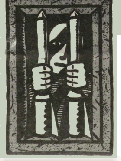Vanunu asks court to abort trial
by Dan Izenberg
THE JERUSALEM POST
Apr. 12, 2005
Nuclear whistleblower Mordechai Vanunu claimed on Tuesday that Israel possessed 200 atomic bombs, hydrogen and neutron bombs and produced 40 kilograms of plutonium each year.
Vanunu spoke in Hebrew to reporters a few minutes before the opening of his trial in Jerusalem Magistrate's Court, addressing his remarks to Channel One and Channel Two television.
He said Yehiel Horev, head of security for the Ministry of Defense, had made a mistake by prosecuting him because in doing so, he was confirming Vanunu's information regarding Israel's nuclear capacity.
While waiting to enter the court building in Jerusalem's Russian Compound, Vanunu showed reporters copies of a letter he received, informing him that the head of the IDF's Home Front Command was considering extending the orders restricting his movements, which are due to expire on April 19.
Interior Minister Ophir Paz-Pines has also informed the Association for Civil Rights in Israel that he was considering extending the order prohibiting Vanunu from leaving the country by another year.
The orders restricting Vanunu's movements within Israel are based on the 1945 Emergency Defense Regulations. According to one of them, Vanunu may not maintain relationships or exchange ideas by any means with foreign citizens or residents nor participate in Internet chats.
Last month, the state indicted Vanunu on charges of violating the orders 21 times.
During Tuesday's hearing, Vanunu's lawyer, Avigdor Feldman, submitted a preliminary argument asking the court to reject the orders issued by "a general" on the grounds that they were extreme, unacceptable in other democracies and violated the law guaranteeing dignity and freedom.
"In a system of law which includes the Basic Law: Human Dignity and Freedom there hides the head of the Home Front Command, who stretches out his long arm, lays his hand on Vanunu's shoulder and tells him he cannot meet with any foreign citizen or resident," said Feldman.
Feldman added that efforts to abolish the Emergency Defense Regulations had failed, but they were still open to interpretation. Interpreting them as granting the army commander the power to restrict Vanunu's freedoms so severely was disproportionate and not for a good reason, he argued.
Feldman asked the court to ignore the fact that the High Court of Justice had already ruled that the orders of the OC Home Front Command were proper. The ruling he referred to came in response to a petition stating the contrary by the Association for Civil Rights in Israel.
Feldman argued that the High Court ruling was based on evidence provided by the state behind closed doors and not in the presence of the petitioners. According to the law, the lower courts may only rule on the basis of evidence that was available to both sides and could therefore not take the High Court ruling into account.
The State Attorney's representative, attorney Dan Eldan, argued that the order of the head of the Home Front Command was valid not on the basis of "generals or colonels" but on the basis of the ruling of men " who were extremely sensitive to human rights." He added that the High Court justices had found the order "reasonable and balanced."
Eldan also rejected another argument put forward by Feldman to the effect that the state had not proved that the people listed in the indictment as Vanunu's interlocutors were foreigners.
Eldan said that none of the people appeared in the Israeli population registry, meaning that whoever they were, they were not Israeli citizens or residents.
The court will convene on May 19 to hear Judge Yoel Tzur's ruling as to whether to accept the defense's arguments or proceed with the trial.
After Tuesday's hearing, Vanunu told reporters he had no confidence in Israeli justice but added, "I won't be silenced. I will exercise my right to freedom of expression."


